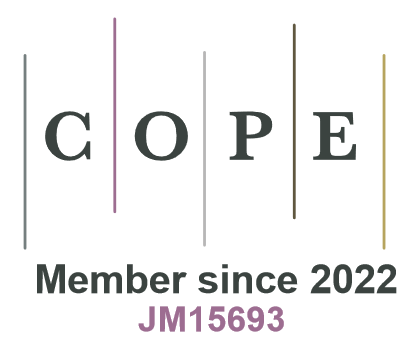Percentile distribution of blood pressure readings in relation to body mass index: a populationbased cross-sectional study ADOPOLNOR
DOI:
https://doi.org/10.1515/anre-2015-0007Abstract
Recent upward trends toward elevated blood pressure and increased weight expressed in terms of body mass index in children and adolescents call for regular monitoring of their physical growth and age-related changes in blood pressure. This requires adequate tools – reference values of a normal blood pressure range. The main objective of this study was to provide sex- and BMI-specific percentile reference values for systolic and diastolic blood pressure based on the adolescent Polish population, participants in the ADOPOLNOR study. A cross-sectional survey was carried out on a representative, randomly selected cohort of 4,941; 2,451 male and 2,490 female students aged 10–18 years, residents in Wielkopolska province and its capital, the city of Poznań. All examinations were performed in school nursery rooms during morning hours according to standard procedures. Body height and weight were measured and BMI was calculated. Blood pressure was measured twice on each occasion on the right arm using a fully calibrated TECH MED TM-Z mercury gauge sphygmomanometer with sets of exchangeable cuffs and a clinical stethoscope. The blood pressure classification was determined using the surveillance method. For each participant, the mean of measurements taken on each of the three occasions was calculated and served as his/her final blood pressure value. Using the LMS method, fitted percentile curves were created for BMI-related systolic and diastolic blood pressure. The findings revealed that age related blood pressure pattern was similar in boys and girls. It showed a steady increase of systolic and diastolic blood pressure with age. There was a positive correlation between the systolic and diastolic blood pressure indicating that when systolic blood pressure increased so diastolic did (r=0.61 at p<0.01). Boys were likely to have relatively higher mean values of systolic and diastolic blood pressure and steeper slope for BMI-related change in blood pressure than girls. Similar pattern was found for age-related changes in BMI. The quotation of 3rd, 5th, 10th, 15th, 25th, 50th, 75th, 85th, 90th, 95th, and 97th at any given BMI between 12 kg/m2 and 35 kg/m2 provided indication of the entire variation in blood pressure of adolescent males and females aged 10–18 years. The sex- and BMI-specific reference values and charts for systolic and diastolic blood pressure may be a useful tool in monitoring blood pressure for early detection of its abnormal level and treatment of children and adolescents with high blood pressure.
Downloads
References
A global brief of hypertension. Silent killer, global public health crisis. 2013. Geneva, World Health Organization.
View in Google Scholar
Al-Sendi AM, Shetty P, Musaiger AO, Myatt M. 2003. Relationship between body composition and blood pressure in Bahrain adolescents. Br J Nutr 90(4):837–44.
View in Google Scholar
Barba G, Casullo C, Dello Russo M, Russo P, Nappo A, Lauria F et al. Gender-related differences in the relationships between blood pressure, age and body size in pre-pubertal children. Am J Hypertens 2008; 21: 1007–10.
View in Google Scholar
Beck CC, da Silva Lopes A, Gondim Pitanga FJ. 2011. Anthropometric indicators as predictors of high blood pressure in adolescents. Arq Bras Cardiol 96(2):126–33.
View in Google Scholar
Berenson GS, Srinivasan SR, Bao W, Newman WP III, Tracy RE, Wattigney WA. 1998. Association between multiple cardiovascular risk factors and atherosclerosis in children and young adults. The Bogalusa Heart Study. N Engl J Med 338:1650 –56.
View in Google Scholar
Bogin B. 2005. Patterns of Human Growth. 2nd edn. Cambridge: Cambridge University Press.
View in Google Scholar
Chen X, Wang Y. 2008. Tracking of blood pressure from childhood to adulthood: a systematic review and meta-regression analysis. Circulation 117:3171–80.
View in Google Scholar
Chobanian AV, Bakris GL, Black HR, et al. 2003. The seventh report of the Joint National Committee on Prevention, Detection, Evaluation, and Treatment of High Blood Pressure: the JNC 7 report. JAMA. 289:2560–72.
View in Google Scholar
Cole TJ, Green PJ. 1992. Smoothing reference centile curves: The LMS method and penalized likelihood. Stat Med 11(10):1305–19.
View in Google Scholar
Cook NR, Gillman MW, Rosner BA, Taylor JO, Hennekens CH. 1997. Prediction of young adult blood pressure from childhood blood pressure, height, and weight. J Clin Epidemiol 50(5):571–79.
View in Google Scholar
Danaei G, Mariel M, Finucane MM et al. on behalf of the Global Burden of Metabolic Risk Factors of Chronic Diseases Collaborating Group (Blood Pressure). 2011. National, regional, and global trends in systolic blood pressure since 1980: systematic analysis of health examination surveys and epidemiological studies with 786 country-years and 5·million participants. Lancet, 377: 568–77.
View in Google Scholar
Dasgupta K, O’Loughlin J, Chen S, Karp I, Paradis G, Tremblay J, et al. 2006. Emergence of sex differences in prevalence of high systolic blood pressure: analysis of a longitudinal adolescent cohort. Circulation 114(24):2663–70.
View in Google Scholar
Durda M. 2011. Biological status of adolescents in relation to their lifestyle behaviours and family’s socioeconomic status. In: Kaczmarek M (ed.) Health and Well – Being in Adolescence. Part one Physical Health and Subjective Well-Being. Bogucki Wydawnictwo Naukowe, Poznań pp 111–37.
View in Google Scholar
Eriksson JG, Forton TJ, Kajantie E, Osmond C, Barker DJP. 2007. Childhood growth and hypertension in later life. Hypertension 49:1415–21.
View in Google Scholar
Fredman DS, Dietz WH,Srinivasan SR, Berenson GS. 1999. The relation of overweight to cardiovascular risk factors among children and adolescents: the Bogalusa Hearth Study. Pediatrics 103:1175–82.
View in Google Scholar
Grajda A, Kułaga Z, Gurzkowska B, Napieralska E, Litwin M (2011) Regional differences in the prevalance of overweight, obesity and underweight among polish children and adolescents. Med Wieku Rozwoj 3(1):258–66.
View in Google Scholar
Hall JE. 2012. Guyton and Hall Textbook of Medical Physiology. The 12 edition. Saunders Elsevier.
View in Google Scholar
He Q, Ding ZY, Yee-Tak Fong D, Johan Karlberg J. 2000. Blood pressure is associated with body mass index in both normal and obese children. Hypertension 36:165–170.
View in Google Scholar
Jodkowska M, Oblacińska A, Tabak I (2010) Overweight and obesity among adolescents in Poland: gender and regional differences. Public Health Nutr 13(10A):1688–92.
View in Google Scholar
Kaczmarek M. 2011. Conceptual frameworks and methodological tools for multidisciplinary approach to the adolescent health research In: Kaczmarek M. (ed.) Health and Well – Being in Adolescence. Part one Physical Health and Subjective Well-Being. Bogucki Wydawnictwo Naukowe, Poznań pp 19–43.
View in Google Scholar
Kaczmarek M. 2012. Adolescents’ health in social context. Poznań Chapter Agder Academi, Poznań DOI: 10.13140/2.1.3396.5768
View in Google Scholar
Kaczmarek M, Stawińska-Witoszyńska B, Krzyżaniak A, Krzywińska-Wiewiorowska M, Siwinska A. 2015. Who is at higher risk of hypertension? Socioeconomic status differences in blood pressure among Polish adolescents: a population-based ADOPOLNOR study. Eur J Ped forthcoming.
View in Google Scholar
Katzmarzick PT, Srinivasan SR, Chen W, Malina RM, Bouchard C, Berenson GS. 2004. Body mass index, waist circumference and clustering of cardiovascular risk factors in a biracial sample of children and adolescents Pediatrics: 114:198–204.
View in Google Scholar
Krzyżaniak A, Stawińska-Witoszyńska B, Szilágyi-Pągowska I, Palczewska I. 2003. Ciśnienie tętnicze dzieci i młodzieży województwa mazowieckiego i wielkopolskiego. Przegląd Lekarski 60(supl. 6):81–5.
View in Google Scholar
Krzyżaniak A, Krzywińska-Wiewiorowska M, Stawińska-Witoszyńska B, Kaczmarek M, Krzych Ł, Kowalska M, et. al. 2009. Blood pressure references for Polish children and adolescents. Eur J Pediatr 168:1335–1342.
View in Google Scholar
Kułaga Z, Litwin M, Zajączkowska M, Wasilewska A, Tkaczyk M, Gurzkowska B et al. (2009) Regionalne różnice parametrów antropometrycznych oraz ciśnienia tętniczego uczniów w wieku 7–18 lat. Probl Hig Epidemiol 90(1):32–41.
View in Google Scholar
Knussmann, R. 1988/1992) Anthropologie, Handbuch der vergleichenden Biologie des Menschen, Band 1. Fischer Verlag, Stuttgart pp 232–285.
View in Google Scholar
Kuneš J, Zicha J. 2009. The interaction of genetic and environmental factors in the etiology of hypertension. Physiol Res 58 (Suppl. 2):S33–S41.
View in Google Scholar
Leccia G, Marotta T, Masella MR, Motolla G, Mitrano G Capitanata G et al. 1999. Sex-related influence of body size and sexual maturation on blood pressure in adolescents. Eur J Clin Nutr 53(4): 333–7.
View in Google Scholar
Moselakgomo VK, Lamina Toriola AL, Shaw BS, Goon DT, Akinyemi O. 2012. Body mass index, overweight, and blood pressure among adolescent schoolchildren in Limpopo province, South Africa. Rev Paul Pediatr 30(4):562–9.
View in Google Scholar
Munter P, He J, Cutler JA, Wildman RP, Whelton PK. 2004. Trends in blood pressure among children and adolescents. JAMA 2004; 291:2107–13.
View in Google Scholar
National High Blood Pressure Education Program Working Group of High Blood Pressure in Children Adolescents. 2004. The fourth report on the diagnosis, evaluation and treatment of high blood pressure in children and adolescents. Pediatrics 114(2 Suppl 4th Report): 555–576.
View in Google Scholar
Ostrowska-Nawarycz L, Nawarycz T. 2007. Prevalence of excessive body weight and high blood pressure in children and adolescents in the city of Łódź. Kardiol Pol 65:1079–87.
View in Google Scholar
Shankar RR, Eckert GJ, Saha C, Tu W, Pratt JH. 2005. The change in blood pressure during pubertal growth. J Clin Endocrinology Met 90(1):163–7.
View in Google Scholar
Sorof JM, Lai D, Turner J, Poffenbarger T, Portman RJ. 2004. Overweight, ethnicity, and the prevalence of hypertension in schoolaged children. Pediatrics 113:475–82.
View in Google Scholar
The American Heritage® Stedman’s Medical Dictionary, 2002 (Accessed at www.dictionnary.references.com on September 22, 2014).
View in Google Scholar
Tu W, Eckert GJ, Saha C, Pratt J. 2009. Synchronization of adolescent blood pressure and pubertal somatic growth. J Clin Endocrinol Metab 94(1):5019–22.
View in Google Scholar
World Medical Association Declaration of Helsinki. Ethical principles for medical research involving human subjects. 2001. Bulletin of World Health Organisation, 79(4): 373–374
View in Google Scholar
Downloads
Published
How to Cite
Issue
Section
License

This work is licensed under a Creative Commons Attribution-NonCommercial-NoDerivatives 4.0 International License.








